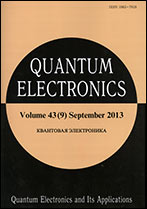|
Brief Communications
Low temperature operation of a chemical singlet oxygen generator
N. P. Vagin, P. G. Kryukov, V. L. Kutuzov, S. V. Loginov, V. Ya. Rosolovskiĭ, N. N. Yuryshev
Abstract:
The range of compositions of the working solution of a gas generator that can be cooled to – 50 °C is determined. It is shown that in the temperature range between – 5 and – 40 °C, the concentration of singlet oxygen at the surface of the solution does not depend on its temperature and is 90 ± 20%.
Received: 11.09.1984
Citation:
N. P. Vagin, P. G. Kryukov, V. L. Kutuzov, S. V. Loginov, V. Ya. Rosolovskiĭ, N. N. Yuryshev, “Low temperature operation of a chemical singlet oxygen generator”, Kvantovaya Elektronika, 12:3 (1985), 641–642 [Sov J Quantum Electron, 15:3 (1985), 421–423]
Linking options:
https://www.mathnet.ru/eng/qe6375 https://www.mathnet.ru/eng/qe/v12/i3/p641
|


|





 Contact us:
Contact us: Terms of Use
Terms of Use
 Registration to the website
Registration to the website Logotypes
Logotypes








